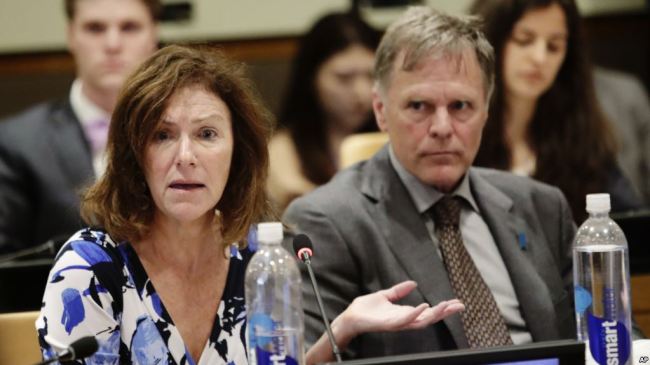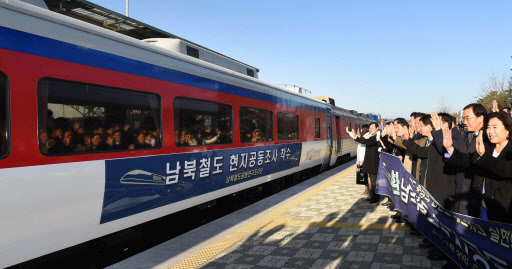剧情简介
 |
| The national flags of South and North Korea fly at the Demilitarized Zone separating the two Koreas, Monday. Yonhap |
By Nam Hyun-woo
Seoul is resorting to an ambiguous approach to Pyongyang over its upcoming combined military exercises with the U.S., by consulting with Washington on offering humanitarian aid to the North.
This is interpreted as the Moon Jae-in government's compromise plan in which the administration can show its willingness for talks with Pyongyang while dodging domestic criticism that it is letting the North take the lead in the inter-Korean tug-of-war over the summertime military drills.
Foreign Affairs Minister Chung Eui-yong had a telephone conversation with U.S. Secretary of State Antony Blinken, Friday in which the two discussed ways to "cooperate with the DPRK in areas such as humanitarian cooperation, and agreed to make continued efforts to engage with the DPRK," his ministry said. The DPRK is an acronym for North Korea's official name, the Democratic People's Republic of Korea.
The U.S. State Department also said the two sides "agreed to explore humanitarian initiatives on the Korean Peninsula."
Following the agreement, South Korea and the U.S. are expected to consult on the list of humanitarian aid, such as foods, vaccines, drugs and medical devices. Since July 30, the Ministry of Unification has been approving private organizations to send humanitarian aid to the North.
The moves come as North Korea is suffering from a food crisis, natural disasters and the COVID-19 pandemic.
The U.N. Food and Agriculture Organization (FAO) and World Food Programme (WFP) forecast that the North is expected to face a food shortage of around 860,000 tons of grain this year, equivalent to approximately 2.3 months' worth of food consumption. Adding more concerns, the North's Rodong Sinmun newspaper reported last week that the regime is taking "emergency steps" to prevent damage from flooding, after a heavy rain resulted in more than 1,170 homes being flooded in the eastern coastal South Hamgyong Province.
South Korea and the United States are extending their hands to the North amid the Kim Jong-un regime's resistance to engage in talks. Last month, the two Koreas restored their communication lines, signaling a breakthrough in inter-Korean relations, but again reached a stalemate as Kim's sister, Kim Yo-jong, called for the suspension of the South Korea-U.S. combined military drills as a precondition for talks.
Suspending the military exercises is a tough choice for the Moon administration, due to concerns over national security and criticisms that Seoul is letting Pyongyang call the shots.
 |
| Helicopters are parked at United States Army Garrison Humphreys in Pyeongtaek, Gyeonggi Province, Monday, a day before the South Korean military and U.S. Forces Korea are set to conduct Crisis Management Staff Training, which is a run-up to the regular summertime drills. Yonhap |
Against this backdrop, the South Korean military and U.S. Forces Korea (USFK) will begin the preliminary Crisis Management Staff Training this week as a run-up to the main summertime military exercises. The full schedule for the 21-2 Combined Command Post Training (CCPT) has yet to be announced, but is widely anticipated to start next week and last for 10 days.
Instead of running a full-scale computer-simulated training, sources said the two countries will hold it in a low-key manner and have a minimum level of troops involved. The overall size of the exercises will be smaller than the last such drills held in March.
Reportedly, the South Korean government is scaling down the joint exercises mainly because of the surge in pandemic cases here, but it is also taking its perceived "recent peace momentum" into account at the same time.
With South Korea and the U.S. adopting a carrot-and-stick approach to North Korea, attention is now on whether the Kim regime will stage a military provocation in protest of the drills, such as test-firing a submarine-launched ballistic missile (SLBM).
On Aug. 3, the National Intelligence Service reported to the National Assembly that the North may test-fire an SLBM if the combined military exercises take place as scheduled. In October 2019, the North claimed that it succeeded in launching a Pukguksong-3 rocket, and last October it showcased its Pukguksong-4 and Pukguksong-5 missiles, which are assumed to be SLBMs.
Following the annual combined military drills in March this year, the North launched two cruise missiles and two short-range ballistic missiles.
In March last year, the regime launched two short-range ballistic missiles and two projectiles believed to be its version of the U.S.'s Army Tactical Missile System, even though Seoul and Washington postponed their springtime training due to the COVID-19 pandemic.
Despite the previous records, experts said the North is anticipated to show a low-key response to the drills, given the current environment for talks and the conditions in the regime.
"Staging a strong provocation is spoiling the mood," said Hong Min, a senior researcher at the state-run Korea Institute for National Unification. "In her comment, Kim Yo-jong said the drills may become a prelude that undermines inter-Korean relations, and didn't mention an immediate military response or the severance of talks."
Hong said any military provocation by the North may result in crucial difficulties in the regime's attempts to control the affairs of the Korean Peninsula, as North Korean leader Kim said in June.
"In the past, the North conducted military exercises in response to Seoul-Washington joint drills, but that happened when the two sides were having live training. A military provocation against this summer's exercises will trigger international criticism and result in the U.S. turning to a hardline approach. Pyongyang's food and other internal affairs are also causing difficulties," Hong said. "Given this, the North is anticipated to denounce the drills in a very restrained manner."








